Five talking points from stage four of the Vuelta a España 2020
Bennett continues his fine form this season
Sam Bennett continues his hot streak
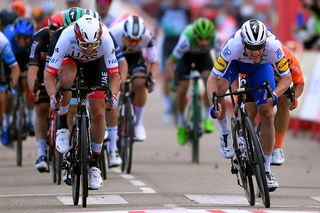
Is there a better sprinter in the world right now than Sam Bennett? The Irishman certainly ended the Tour de France as the man to beat, with a triumphant victory on the Champs Élysées stage to seal the green jersey and has started the Vuelta a España in similarly great form with victory on stage four.
He and the other sprinters have had to wait a while for the first bunch sprint of the Vuelta, but enjoyed a straightforward finish today, with Bennett comfortably faster than Jasper Philipsen (UAE Emirates), Jakub Mareczko (CCC) and Pascal Ackermann (Bora-Hansgrohe).
The win is Bennett’s seventh of the season, and third in a Grand Tour sprint, as he continues to excel following his breakthrough at the top level a couple of years ago. Victory today means the Irishman has now won stages in each of the last four Grand Tours he has competed in, which will be real vindication after he left his former team Bora-Hansgrohe due to them not giving him enough opportunities to ride in Grand Tours.
The only sprinter with more wins than Bennett this season is Arnaud Démare (Groupama-FDJ), and he has arguably picked up his tally of wins against slightly inferior opposition at the Giro d’Italia and other, smaller races that ran parallel to the Tour de France. It would be fascinating to see both of them go head-to-head, as right now no-one else in the world seems to be at their level.
Jasper Philipsen emerges as Bennett’s biggest rival

Bennet’s former Bora-Hansgrohe team-mate Pascal Ackermann had been expected to be his main rival in the sprints of this Vuelta, but on the evidence of today, it is the ever-improving 22-year-old Jasper Philpsen who might prove his biggest barrier to a larger haul of victories.
Get The Leadout Newsletter
The latest race content, interviews, features, reviews and expert buying guides, direct to your inbox!
Philipsen very nearly caught Bennett out today. Despite still having two team-mates still with him on the finishing straight, Bennett was surprised to see the young Belgian launch his sprint early and let a gap of several bike-lengths open up. Bennett did ultimately manage to close that gap, but the big effort it required illustrated just how much power Philipsen managed to produce.
Making just his second Grand Tour appearance, after featuring in some of the bunch sprints of last year’s Tour de France, Philipsen enters the Vuelta with good form, having won the opening stage of the BinckBank Tour a few weeks ago.
Second-place today was his best yet at a Grand Tour, and on this basis could land a maiden victory at his level on one of the bunch sprints to come.
Deceuninck - Quick-Step have strength in numbers
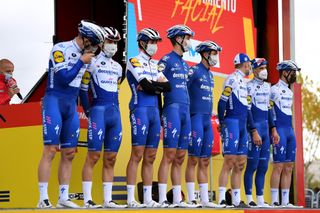
This season Deceuninck - Quick-Step might not have produced perfect lead-out trains with quite the regularity of recent years, but today they were very much back to their best.
The Belgian team swarmed the front of the peloton inside the final three kilometres ahead of a crucial final roundabout, taking control of what had been a messy free-for-all at the front of the bunch with a long train that featured every one of their riders.
Bennett commented in his post-race interview on his surprise at having so many domestiques still supporting him at this late stage, and found himself in an enviable position as one-by-one his teammates did a short, quick turn to keep the pace high and himself in the perfect position towards the front.
The only hiccup came when his final lead-out man was unable to follow Philipsen’s pace when he started his sprint, but that hardly mattered as Bennett had already been ideally positioned, and was capable of sprinting into Philipsen’s slipstream and passing him at the line.
Exposed roads cause tension in the peloton
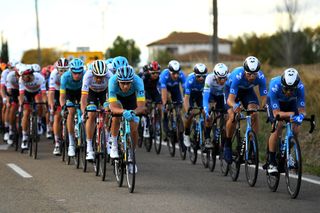
At first glance this was a simple, mostly uneventful stage — a break got clear at the start of the day, were kept at a safe distance by the peloton, and then caught shortly before the inevitable bunch sprint.
However, that only tells part of the story. The flat parcours may have meant this was not a day for the climbers, but had the side-effect of bringing crosswinds into play.
Although the winds today were not actually that strong, the empty plains and exposed roads the riders passed through during the day still posed a threat. The GC teams were aware of the danger and battled to ride at the front to ensure their leaders were kept safe, with Movistar a particularly aggressive presence, and at times the pace was ferocious.
All this activity followed the pattern of the past two stages, which also saw teams move to the front in anticipation of splits. It might ultimately have been of no consequence, as the peloton remained mostly intact on each stage with all the favourites present, but is sure making for intriguing racing on what might otherwise have been a dull day.
Sunday’s planned Pyrenean climbs are cancelled

The day began with the disappointing news that stage six was set to be drastically altered, with the planned crossing over the French border deemed impossible due to Covid-related restrictions.
Instead of finishing atop the legendary Col du Tourmalet, which had been expected to be one of the spectacles of the race, the stage will now finish atop the less difficult category one Aramon Formigal climb.
Still, it’s not as is if this year’s race doesn’t still feature its fair share of climbing. The Tourmalet was not in fact even going to be the hardest summit finish of the race — that title belongs to the Angliru, which awaits the riders at the end of next week on stage twelve.
Also, although the climb’s cancellation might come as a disappointment for us fans, it will be greeted as a rare piece of good news for the sprinters braving this year’s race. After the initial Covid-related changes to the route hit them the hardest, with two expected bunch sprint stages planned in the Netherlands being cancelled, they can at least now take comfort that some of their most loathed climbs will no longer have to be.

Thank you for reading 20 articles this month* Join now for unlimited access
Enjoy your first month for just £1 / $1 / €1
*Read 5 free articles per month without a subscription

Join now for unlimited access
Try first month for just £1 / $1 / €1
Stephen Puddicombe is a freelance journalist for Cycling Weekly, who regularly contributes to our World Tour racing coverage with race reports, news stories, interviews and features. Outside of cycling, he also enjoys writing about film and TV - but you won't find much of that content embedded into his CW articles.
-
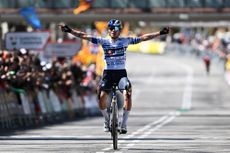 Can anyone stop Primož Roglič or Juan Ayuso from winning the Giro d’Italia?
Can anyone stop Primož Roglič or Juan Ayuso from winning the Giro d’Italia?Roglič and Ayuso's form suggest they are the two outright favourites for overall victory in Rome next month
By Tom Thewlis Published
-
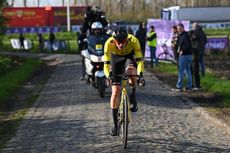 How to watch Dwars door Vlaanderen 2025: Everything you need to live stream the cobbled Belgian Classic
How to watch Dwars door Vlaanderen 2025: Everything you need to live stream the cobbled Belgian ClassicAll the information on broadcasters and live streams for Dwars door Vlaanderen on 2 April, as Wout van Aert, Mads Pedersen, Marianne Vos and Lotte Kopecky take on the cobbles.
By Tom Davidson Last updated